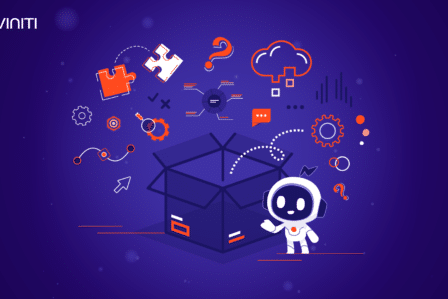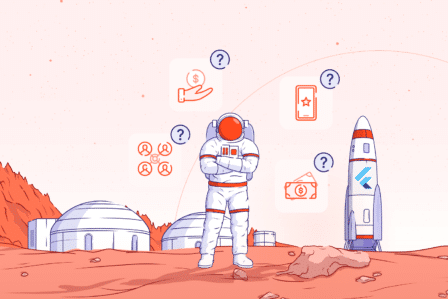At the threshold of a cognitive revolution

The upcoming years will bring more and more applications based on artificial intelligence (AI). No wonder; the tangible business benefits from the use of such tools are much more significant than from classic software.
Applications based on artificial intelligence (AI) ‘aren’t a vision from the future anymore. Of course, we ‘don’t have access to the sophisticated solutions envisioned in TV series (such as ‘HBO’s “Westworld”). Everyday business applications of this type have nothing to do with it breakthrough technologies introduced by such giants as Apple, Facebook, or Tesla, whose factory is considered an icon of the industry philosophy 4.0.
Despite that, software using machine learning is becoming more and more popular among companies, enterprises, and the public sector, and their share in the software market is rapidly growing. Deloitte’s “State of Artificial Intelligence for Enterprises” research report from 2018 states that as many as 90% of the surveyed companies invest in such technologies and see the benefits of such innovations (Return on Investment).
The approach of directors and IT professionals in American enterprises for AI-based applications is very enthusiastic, especially since their users use cognitive technologies more skillful than they declared in a similar study carried out a year earlier.
And we ‘shouldn’t be surprised by this enthusiasm. Well-implemented artificial intelligence mechanisms can improve the operational efficiency of enterprises in various fields: from customer service to IT security and business process management. And it’s not just about support for the management staff to make tactical and strategic decisions, but also relieving operations from their duties: for example, planning conferences, team meetings or business trips. Cognitive solutions can contribute to the optimization of the activities of financial departments and accounting, as well as support the tedious recruitment processes in HR.
The weak link
The potential of machine learning and cognitive thinking in the custom sector development is interesting not only in business practitioners or IT teams implementing intelligent applications, but also scientists. One team of researchers who are looking for an answer to the question of how AI can improve business processes of companies is the group of professor Marlon Dumas from the University of Tartu. Professor Dumas, along with an international group of collaborators, has offered a completely different view on the applications based on cognitive processes. The Estonian researcher recently obtained a grant from the European Research Council (ERC) and began working on a tool for automating the detection of root causes behind ineffective results in business processes.
The program is called the Process Improvement Explorer (PIX) and can increase corporate efficiency by identifying weak links in the company’s operation and suggesting solutions to problems in dysfunction operating areas.
How does it look in practice? Imagine that in a given the region still struggles with delays in the delivery of ordered products. PIX will detect which customers are affected by the delay and track the cause. That can be it, for example, missing information required for the supplier to complete the customs clearance document. Artificial intelligence will detect such problems and suggest methods for preventing them in the future.
AI teaches empathy
Career tools and applications using AI mechanisms began from simple virtual assistants used in customer service, on the first front line in many companies. With time, live chats based on artificial intelligence, which freed people from boring work became standard and then began to evolve interestingly.
An excellent example is the AI application created by the Boston-based Cogito company, which serves to improve the emotional intelligence of customer service representatives. The tool, recognized by Forbes magazine as one of the most exciting AI applications in business, integrates the mechanisms of machine learning and behavioral sciences to analyze millions of phone calls. On that basis, it improves the efficiency of call-center agents and allows them to develop social skills like empathy and patience.
Tracking fraud and anomalies
The most common application of programs based on artificial intelligence in business is IT security. The consulting company Gartner anticipates that by 2020, at least 75% of security applications will use predictive analytics and machine learning algorithms. These types of tools are doing very well, for example, in the fight against fraud committed by means of electronic mail.
An interesting solution is the Trend Micro DNA Writing Style app that uses AI mechanisms to creating a user style writing pattern (e.g., based on punctuation) including over 7,000 features. After detecting a “suspicious” message, its language is compared to the model developed using AI, and a warning is sent to the sender and recipient.
You ‘don’t need to look far for innovative applications based on artificial intelligence that supporting business processes. An example from the Polish tech scene is the Adaptive Vision system developed by the Future Processing company from Gliwice, which, thanks to algorithms based on artificial intelligence, analyzes camera images, enabling visual quality control and automatic detection of defects and anomalies in products. The system can be used in a wide range of industries – from inspection of photovoltaic panels, through automatic detection of buildings and roads in satellite images, to the processing of medical images – demonstrating the versatility of such solutions.
E-prediction services
Solutions based on AI mechanisms reach not only enterprises as a form of building market competitiveness, but also public institutions. Such tools pave the way for digital public services. The pioneer of this approach is Estonia, which uses data collected by public institutions for analytical purposes, thus creating services of the new generation – e-prediction services.
An example of that is predictive medicine. Data collected by the Estonian health service are used to predict susceptibility to type 2 diabetes. Thanks to this, patients who are at risk and whose medical data has been previously collected are informed about that and can take remedial measures.
Intelligent applications also support the British health system. The NHS has launched a test chatbot that serves as an alternative to calling 111 (without emergency) operating in North London. Residents needing help could add their symptoms into the application, which then “compiled” them with an extensive medical database and offered answers tailored to the entered information.
Artificial intelligence 4.0
There are many indications that we are at the threshold of a technological revolution associated with using artificial intelligence. AI is boldly entering different areas of life, affecting the way we work, play, or cure diseases. Trend analyzers from Deloitte estimate that by 2025, the use of this technology will be widespread and modernize up to 80 percent of business processes.
However, experts in new technologies argue that the era of “real” artificial intelligence is still ahead of us. A new, better version of AI will be able to learn by itself – similar to, for example, the neural networks that support Google DeepMind which create connections and new meanings without relying on predefined behavioral algorithms.
This technology will be able to improve the previous iterations, becoming smarter and more aware, increasing its capacities, and expanding knowledge. The use of such solutions in practice is still a rarity and reserved for technological precursors, but ‘it’s worth getting ready for the significant changes that are about to take place.




